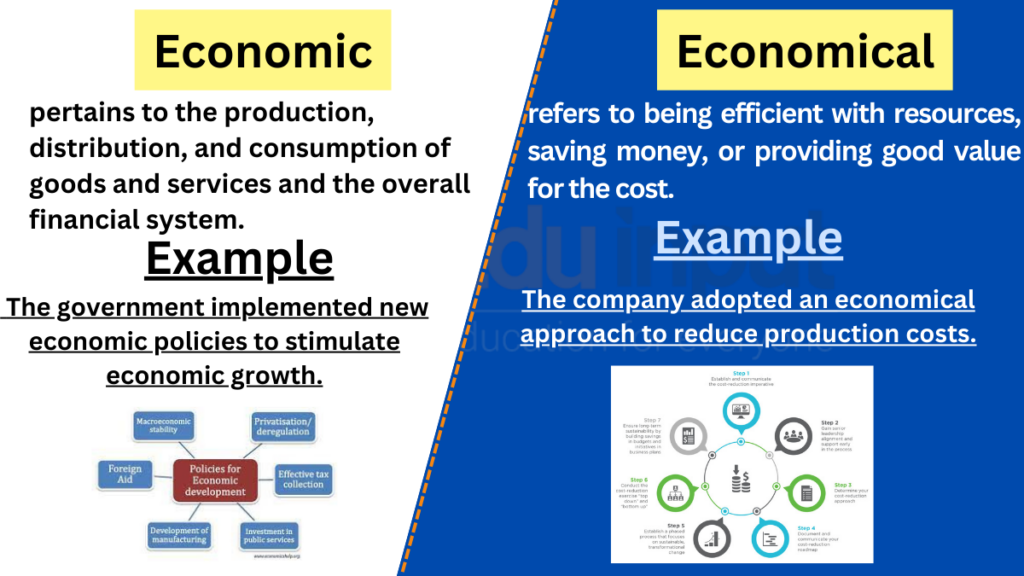Economic vs. Economical-Difference between and Examples
The English language often presents us with words that are similar in sound and spelling but have distinct meanings. “Economic” and “economical” are two such words that can be easily confused. While they both relate to matters of finance and efficiency, they are used in different contexts and convey different nuances. In this article, we will explore the differences between “economic” and “economical,” providing clear definitions, examples, and comparative analysis. By understanding their meanings and usage, we can ensure accurate and effective communication.

Meanings and Examples
Economic meaning
It is an adjective. The meaning of Economic pertains to the production, distribution, and consumption of goods and services and the overall financial system.
Economic Examples
a) The government implemented new economic policies to stimulate economic growth.
b) She studied economics in college to understand market trends and business strategies.
c) The economic recession had a significant impact on job opportunities and consumer spending.
Economical meaning
It is an adjective. The meaning of Economical refers to being efficient with resources, saving money, or providing good value for the cost.
Economical Examples
a) They purchased an economical car that had excellent fuel efficiency.
b) Using energy-saving appliances and practicing recycling are economical habits.
c) The company adopted an economical approach to reduce production costs.
Difference between and Examples
| Economic | Economical | |
| Adjective | Pertaining to production, distribution, and consumption | Being efficient with resources or providing value |
| Example | The government implemented economic policies | They purchased an economical car |
| Usage | Referring to financial systems, growth, and market trends | Describing efficient use of resources or saving money |
| Grammar | Adjective | Adjective |
Usage in a Paragraph
The economic policies implemented by the government aimed to improve the overall economic stability and stimulate growth. They focused on enhancing productivity, attracting investments, and creating job opportunities. At the same time, individuals and households sought ways to be more economical in their daily lives. They embraced energy-saving practices, such as using LED bulbs and adjusting thermostat settings, to reduce utility bills. Additionally, they made economical choices when shopping, comparing prices and opting for products that provided good value for the cost. This contrast between the macroeconomic measures taken at a national level and the microeconomic decisions made by individuals exemplifies the distinction between “economic” and “economical.”
Distinguishing between “economic” and “economical” is crucial for clear and accurate communication. While “economic” relates to financial systems, growth, and market trends, “economical” emphasizes efficiency, resourcefulness, and value for money. Using these words appropriately can avoid confusion and effectively convey our intended meaning. Whether discussing economic policies or making economic choices in daily life, understanding the distinctions between these terms will enhance our communication skills and promote better comprehension.



Leave a Reply